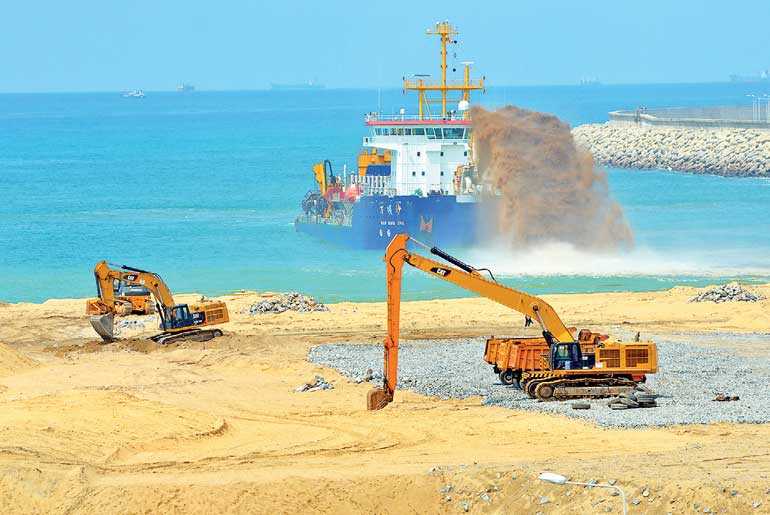Monday Feb 23, 2026
Monday Feb 23, 2026
Tuesday, 24 April 2018 00:00 - - {{hitsCtrl.values.hits}}

The stories of sea erosion farther south on the coast of that city directly attributable to this ill-conceived effort are only now beginning to seep out despite the attempts of the current Government and its predecessor to hush up such bad news – Pic by Shehan Gunasekara
In everything from “mega city” projects through high-speed highways to wresting land from the Indian Ocean in order that the Chinese build some gleaming, high-rise-covered new enclave for themselves, this nation is caught up in a national inferiority complex that is predicated on, no matter what we are dealing with, the belief that “bigger is better.”
This is ironical because the “developed world,” at least the thinking elements in it, are re-examining the whole business of “economies of scale” because the problems that have arisen from trying to construct everything on the basis of a simplistic application of that philosophy are beginning to prove insurmountable.
Port project impact
Take the rape of the land in the south-west quarter of Sri Lanka: the attempt to add to the dry land west of the city of Colombo. The stories of sea erosion farther south on the coast of that city directly attributable to this ill-conceived effort are only now beginning to seep out despite the attempts of the current Government and its predecessor to hush up such bad news. In fact that consistency in concealing facts of enormous importance is the commonality shared by the Rajapaksa horde and the Yahapalanaya bunch.
Insofar as the port project is concerned our neighbourhood has been directly affected because of the removal of massive quantities of granite and the emergence of sand mining as a major problem in one of the two primary source streams of the Deduru Oya.
Below where we live are five separate granite quarries which have been in operation since the flurry of highway building and dry land expansion began in the ocean adjacent to Colombo. To this number has now been added what seems like, far and away, a much larger operation. Local gossip has it that, while this operation is marginally outside the province in which all of us reside, the Central Province, and is on the edge of North Western Province, it seems to be seriously affecting water sources on our slope of that particular mountain range.
The most dramatic evidence of this is the fact that spring water sources that had diminished to the point of near-disappearance during the extended drought experienced here recently had not picked up with the recent showers and, in fact, the flow of water in the few springs still showing signs of life had diminished!
We were informed that there had been massive protests at the time this particular quarry began operations, supplying aggregate for the construction of the “Kandy Highway.” However, it seems like the situation was defused by the subterfuge of moving the crushing element of the operation to another location in the Central Province.
The fact that the owner(s) of the quarrying operation are either politicos or attached to them does not hurt their efforts to avoid prosecution for one of the most serious crimes against humanity there is – depriving people of a potable water supply (or water of any description for that matter.)
The explosions that emanate from this Gommunawa/Ambatale mountain range quarry are massive, several times louder than those we hear from any of the quarries below us. Word of mouth has it that the regulations restricting the size of a charge to break up the huge granite masses are observed in the breach and are, in fact, several times the permissible size. Certainly, the explosions are reminiscent of large bombs dropped by military aircraft.
Running out of water
For some time now, the residents of the neighbouring “colony,” in fact a squatter settlement, have used water from storage constructed by us on my land in anticipation of the droughts that threatened our water supply. However, while this storage helped tide everyone over the worst water shortage ever experienced here, the reduction in flow after the recent rains, has created something close to panic. Bad enough running out of water during a drought but losing even a much-reduced supply AFTER the rains began?!
I have, perhaps, the unfortunate distinction compared to my neighbours, of having spent a significant part of my life in a jurisdiction where a particular segment of big business called the shots. Alberta, the Canadian province known as the “Land of the Blue-eyed Sheikhs” because of the abundance of fossil fuels under it – oil, gas, the oil sands and huge coal deposits – was, basically, controlled by the energy sector who did whatever they chose with complete impunity for several decades.
Among their exploration activities was “fracking” a process of sending a charge of explosive deep into the bowels of the earth, exploding it and determining from the measurements of the explosion, the nature of the soil strata and, from that determination, whether there was fossil fuel below the surface.
In vast swathes of prairie and Rocky Mountain foothills, the energy exploration companies were entitled, by law, to enter any land on which they had a surface lease from the government and, literally, do what they pleased there. I have a clear recollection of a rancher who had reached the end of his tether in the matter of these trespassers and used his game-hunting rifle to put one six feet under! Unacceptable frontier justice, perhaps, but understandable in the circumstances.
Anyway, one little foothills town that was famous throughout Canada for the quantity and quality of its spring water suddenly had that fame wrenched away from it.
The residents of little Nanton, Alberta woke up one morning to find that, probably the most famous spring in the second largest country in the world had run dry! What is of significance in this context is that this spring had, up to then provided the supply of H2O that justified a bottling plant, the only one of its kind in Canada.
The fact that Fracmaster, one of the largest and best-known fossil-fuel exploration companies, was active in the area was downplayed by a government that absolutely dominated the politics of the province for more than three decades primarily because of the support provided it by the oil companies.
Today, fracking has become one of the most contentious practices in the world and widely-opposed everywhere.
Sri Lanka
Does Sri Lanka, in the interests of the robber barons who control our destiny have to go through a similar experience where, virtually overnight, residents are deprived of their supply of one of the absolute essentials to their very survival before people wake up?
Yes, it is as serious and dramatic as that!
Who does one turn to in these circumstances?
Since, by all accounts, there are “politicos” involved in the business that is causing this life-threatening situation, appeals to the local “movers and shakers” would be a futile exercise.
Direct, violent, action is, obviously, not an option either.
Perhaps what might be the only straw available for clutching could be media exposure of this truly unbelievable state of affairs. However, even here, given the Nelsonian behaviour of the Sri Lankan media which seems to turn a blind eye on transgressions of this kind, particularly if it involves the conduct of powerful politicians, irrespective of their stripe, it seems but a forlorn hope.
Divine intercession is not, by choice, the refuge of an atheist or an agnostic. However, that seems like the only dim, distant light at the end of this particular tunnel, an indication of the desperate predicament in which we have been placed in this part of our “land like no other.”
So much for democracy and its practice in the interests of the citizenry!